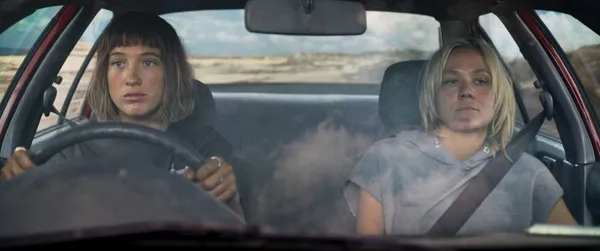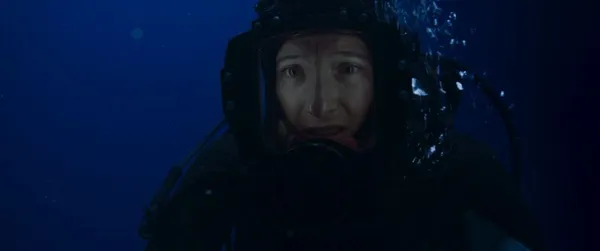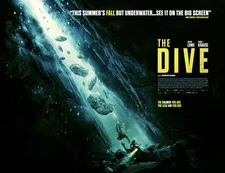 |
| Sophie Lowe and Louisa Krause as Drew and May in The Dive. Maximilian Erlenwein: 'It was crucial for me to make it as real and realistic as possible' |
Maximilian Erlenwein's The Dive takes the plunge with two sisters, Drew (Sophie Lowe) and May (Louisa Krause), as they head off on their annual diving trip together. The isolated location proves to be a threat, however, when May becomes trapped beneath the waves and Drew faces a race against the clock to try to save her. Shot on location in Malta and the neighbouring island of Gozo, Erlenwein was determined to keep the underwater shooting as authentic as possible, which meant both actresses had to learn how to dive. We caught up with him ahead of the film's FrightFest screening and UK release to talk about the challenges.
Do you dive yourself?
Maximilian Erlenwein: Oh, yes. I did a lot of diving when I was younger. And then I made a little break, and the film got me back into diving. But I had a big passion for it. That was actually one of the reasons I really wanted to do this film.
There's quite a lot of detail about diving and that involves, and how important was it for you to get those elements in there and be true to the spirit of diving? Because I feel like it's quite an accurate portrayal of things that could happen underwater.
ME: Absolutely. That was crucial for me to make it as real and realistic as possible. I love diving and I love the ocean. I wanted to make a film for divers also, and to make it like this could kind of happen, to put you into that position, what would you do? If there is a shark or supernatural, exaggerated elements it always leaves, for me, this sphere of a real survival thriller, when you're really into it, because it feels real. And the protagonists feel real, they're not over the top people. They're not superheroes with super strength. They're normal. Women who kind of get into this terrible situation.
How hard was it to cast because you decided that you wanted to shoot a lot of this underwater, which is going to present all sorts of logistical issues.
ME: We started looking for actresses who could actually dive and it was pretty obvious pretty soon, there was no chance. I mean, there are so few actresses who can really dive. So we said, “Okay, we have to find actresses who are crazy enough to do this". Because, from the beginning, we wanted to shoot everything underwater, there's almost no VFX in it. So we made a big casting process in the middle of Covid, so it was all over Zoom, which was additionally tough. Then we found Sophie and Louisa. The thing is, with diving, even if you really want to, it can happen that you can't psychologically. And it can even happen after a week or two weeks that you freak out in the water and you say, “Okay, that's it for me, I'm done.”
 |
| Maximilian Erlenwein on his stars Louisa Krause and Sophie Lowe learning to dive: We were really lucky that Louisa and Sophie were just natural talents |
We were really lucky that Louisa and Sophie were just natural talents, so to say. We started very, very slow with the training, just the most basic stuff in the beginning. And really, really calm too, to make sure that they have fun, and they don't think too much about the project. And then they got into it and they got really good. I mean really good. To act underwater, to have to be in panic or to be frightened to your core, it's very close to the real emotion. And if this happens under water, it's really dangerous. We had to make sure that they were really experienced and, and well trained.
How long did they learn for?
ME: A few months then they came to Malta and had special training with our dive crew in Malta, who are really good and then they trained specifically the things we needed for the film.
How deep underwater were you shooting?
ME: Well, it depends. We shot in the ocean and in the studio. And, of course, in the studio, you try to be as shallow as possible. So it was three metres or something. Everything which is under the rock is a setup and it's like two or three metres. But in the ocean, we went to 30m or something.
I imagine that's also a challenge for you cinematographer to be going to that sort of depth and shooting.
ME: Absolutely. We had brilliant underwater cinematographers. They were really underwater and my DOP Frank Griebe was with me at the monitor. Well, that was at least the idea that we have a picture monitor Of course, it's technically challenging, because you know, the signal goes from the camera over a cable to the monitor, and very often you lose the signal.
How did you find the location?
ME: We went diving. It was an underwater location tour for the underwater locations. We pretty soon found out that Malta was the best spot to shoot this because of all the experience they have with underwater shooting, it's a very vivid film industry there. Hollywood does a lot in Malta, there are big studios there. So you have these beautiful underwater but also land locations, because we couldn't divide it. We had to shoot it underwater stuff where we shot all the stuff which happens on land.
You shot it in English, was that always your intention?
ME: Yes, absolutely. That was what attracted me to the project. When Augenschein Filmproduktion, the production company approached me, it was an English project and you know, for a German film director that's like the gateway to the world. Of course there is a tiny language barrier because it's not my mother tongue. But I had a coach and I trusted the actressea. There is quite a challenge, but not that much in directing, more in writing. Do you get the details of the language and the subtext right? I tried my best.
What was the post-production work like?
ME: It was mostly sound. Visually we didn't do that much. It was more to match the studio underwater world to the real underwater ocean world. It's a lot about particles but we did this also in front of the camera. It's a lot of you know, you got to get the water texture right. To do that in post is very expensive, because you have to have 3D particles blah, blah, blah. So we made sure we had different layers of particles in the water to make it look real. And then the most fun part in post was really the sound. Because you can do so much on the water of course.
 |
| Sophie Lowe as Drew. Maximilian Erlenwein: 'The sound adds a lot of the tension and the thrill. We focused very much, for example, on the breathing, to get this terrified feeling' |
It's a world that the audience is not used to, which is, for real, an absolutely fascinating world to be in. I mean, diving is the best, I recommend it to everyone. It's like flying over a different planet, with the weirdest aliens and animals. And what happens in the sound is so immersive and so weird and so psychedelic. And, of course, the sound adds a lot of the tension and the thrill. We focused very much, for example, on the breathing, to get this terrified feeling.
When you're shooting a film like that, does it require you to think on your feet a lot more because of working with water. Did everything go to plan when you were there?
ME: Now the thing is, when you really shoot underwater, it's, I guess, like shooting a documentary about mountain lions in the jungle or something - it's in nature, and you can't predict stuff. So you're very dependent on the weather. We went out sometimes with the whole crew on a big boat and then, you know, the weather doesn't want to shoot and you try to do it, but then there's a current or the visibility on the water changes from one hour to the other, and you can't see anything any more. You’ve really got to be Zen, you have to be really relaxed, because you can't control it. What we learned is we had to bring the whole process down and make it as simple as possible, with as few people as possible. So we started with the big diving boats. And then we went down to really the smallest boats there are to be super flexible. And then in the end, I just had a little monitor, but right above where we shot on a very little boat. And then I could even jump in with a snorkel and see everything from above.
Obviously, with all films, there's a lot of preparation, but I just feel like with this film in particular, you must just have had to be so prepared before you were kind of doing everything really?
 |
| The Dive poster |
ME: Oh, yeah, absolutely. It's all about preparation. We rehearsed the scenes and everything a lot. And you know, and when we shot in the ocean, it was like a military operation. We made a briefing before about exactly what we needed. We actually had underwater storyboards also, so we could take the storyboards underwater too.
How long were they able to act underwater at a time in the sea?
ME: We had to check the nitrogen level of everyone who's underwater. And if the nitrogen level of one guy is already exceeded, and the dive computer says he has to go up, most of the time, everybody has to go up. So we had 45 minutes, 50 minutes per dive, and that like maybe three times, four times a day, that was it.
A lot of people will have seen the freediving documentary The Deepest Breath on Netflix. That film really makes you aware of the dangers.
ME: Absolutely, I love that film, it’s so good.
Have you ever tried freediving?
ME: Yeah, I have tried a little bit because. Many of our divers in Malta also do freediving. And we actually had free divers in the ocean because they can go down and up again, very fast. You can't do this with a scuba diver, scuba divers just can't go up and then down again. So if there had to be a prop delivered from the surface, there were free divers doing it. I have to say the fascination for freediving grew on me. People who do freediving are so chilled. It's all about meditation, you have to calm your thoughts and bring everything down. It’s like in The Dive, the less you think, the less air you use. That's the beauty of diving and the beauty of the ocean as a metaphor. You dive into your own subconsciousness, so to say, and then confront your real inner self. There's such a psychedelic and meditative element to this to diving into the ocean.
What’s next for you?
ME: I’m in the middle of pre-production for the second season of Netflix’s The Empress. We start in September and the shooting is until February. But I would be very interested to shoot my next film also in English. So I have a few things in my drawer.





















